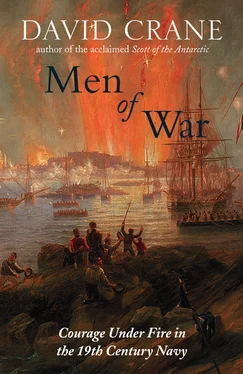There had never been any shortage of sympathisers, though, and at the beginning of March 1823 an inaugural meeting of the new London Greek Committee was held at the Crown and Anchor in London’s Strand. The moving spirits behind its formation were the usual suspects associated with the liberal causes of the day, and their manifesto lacked nothing of the woolly sentiment that characterised the earliest ‘friends of humanity, civilization, and religion’. It was time to redress Britain’s record, it announced, and ‘time … to make a public appeal … in the name of Greece. It is in behalf of a country associated with every sacred and sublime recollection: – it is for a people formerly free and enlightened, but long retained by foreign despots in the chains of ignorance and barbarism!’
If this could just as easily have come from Boston or Berne as London, there were forces at work within the Committee that potentially distinguished it from its European or American equivalents. At the core of the small active membership was a group of skilled and practised politicians, and as Britain’s foreign policy under Castlereagh’s successor, George Canning, began to thaw towards Greek aspirations, the Committee found itself and its cause in an unlikely – if undisclosed – harmony with British national interests.
Without the tacit connivance of the authorities the London Committee could have done little, but in the short term of even greater importance to Greece was the potential access to the London money markets at a time when a drop in interest on government bonds was making foreign loans an attractive proposition. In its early days the Committee’s attempts to raise funds from voluntary donations had been modest at best, but by 1823 a heady mix of idle money, speculative greed and philhellenic high-mindedness had conjured up dreams of a Greek gold bonanza on a scale to dwarf anything that had gone before.
With the future colonial governor John Bowring, the radical MP Joseph Hume and the politician-money man Edward Ellice all deeply involved, there was no shortage of financial acumen available to the Committee, but what was required was a ‘name’, and for that only one would do. From the first founding of the Committee its most famous member had been the exiled Byron, and in a spectacular propaganda coup Blaquiere had broken off his journey to Greece at Pisa in order to persuade him to take on the leadership of the cause his verse had done so much to popularise.
It did not matter that there was not a single original idea in that verse; it did not matter that the exiled poet would as soon have gone to Spain or South America; it did not matter that he was a faddish and overweight thirty-six; or that it would take him another five months to get even as far as Cephalonia: it was the Byron name that the Committee had been after, and Hastings’s reaction showed how well they had gauged its effect. It would be hard to imagine anyone better equipped by birth or temperament to resist its lure, but from the day Hastings met Blaquiere the thought of Byron haunted his imagination, easing the frustrations and miseries of the Cretan campaign with visions of a role in the war and a strategy for winning it that suddenly seemed something more than dreams.
A ‘violent and dangerous’ relapse on his return to Hydra from Crete left it looking unlikely that Hastings would live long enough to see out the week, never mind to see Byron, but he had already prepared his brief. ‘Lord Byron’s companions Hamilton Brown & Mr Trelawny arrived & called on me,’ he noted in his journal on 11 October, after a meeting with the two ‘secretaries’ Byron had sent on ahead of him to report back from the ‘Seat of War’. ‘I gave Mr Brown my letter for Ld Byron containing my views on Greece & he engaged to forward it safely.’
Hastings’s letter had had a long and hard birth – draft after draft, heavily scored and annotated, survive among his papers – but the result is the most impressive and clear-sighted strategic document to emerge from the revolution. Behind it lies not just eighteen months’ experience of Greece, but fifteen years’ service in a navy whose strong empirical problem-solving tradition equipped him to move from the large picture to the detail with a persuasive authority.
‘Firstly,’ he wrote to Byron – having duly larded his arguments with the appropriate compliments to the ‘First Genius of the Age’, ‘I lay down as an axiom that Greece cannot obtain any decisive advantage over the Turks without a decided maritime superiority; for it is necessary to prevent them from relieving their fortresses and supplying their armies by sea.’
The only weapon against Turkish fortresses that the Greeks had, Hastings argued, was famine, and without it they would have achieved nothing. In those outposts where the Turks could resupply their garrisons – Patras, Modon, Coron, Negropont – the Greeks had been powerless, and in a terrain that made movement and supply difficult, an army without artillery, engineers or the finance to sustain itself in the field for any length of time was never going to be the answer.
If this seems self-evident now, it did not then – any number of British or European officers thought the war could be won on land – but Hastings had not finished there. ‘The localities of the countries are also such,’ he went on presciently, ‘and the difficulties of moving troops so great, that, without the aid of a fleet, all the efforts of an invading army would prove fruitless. But on the contrary, were an invading army followed by a fleet, I fear that all the efforts of the Greeks to oppose it would be ineffectual. The question stands thus, Has the Greek fleet hitherto prevented the Turks from supplying their fortresses, and is it likely to succeed in preventing them?’
The answer to both questions was ‘no’, and Hastings was one of the few to see that the comparative calm of 1823 had more to do with other pressures on the Ottoman Empire and the disastrous fire in her main arsenal at Tophana in March that year than with any real security. ‘Is it likely that the Greek marine will improve, or that the Turkish will retrograde?’ he asked, remembering, perhaps, that austere, relentless and unforgiving figure he had glimpsed from the deck of the Sea Horse thirteen years earlier.
The contrary is to be feared. We have seen the Greek fleet diminish in numbers every year since the commencement of the war, while that of the Turks has undeniably improved, from the experience they have gained in each campaign … Is the Greek fleet likely to become more formidable? On the contrary, the sails, riggings and hulls are all going out of repair; and in two years time thirty sail could hardly be sent to sea without an expense which the Greeks could not probably incur.
With the Ottoman fleet again at sea, and Ibrahim Pasha’s Egyptians subduing Crete before turning their attention to the Morea, there was an unarguable force to Hastings’s argument. But he also had an answer. ‘We now come to the question, How can the Greeks obtain a decisive superiority over the Turks at sea?’ he continued.
I reply, By a steam-vessel armed as I shall describe … It would be necessary to build or purchase the vessel in England, and send her out to complete. She should be from 150 to 200 tons burden, of a construction sufficiently strong to bear two long 32-pounders, one forward and one aft, and two 68-pounder guns of seven inches bore, one on each side. The weight of shot appears to me of the greatest importance, for I think I can prove that half a dozen shot or shells of these calibres, and employed as I propose, would more than suffice to destroy the largest ship. In this case it is not the number of projectiles, but their nature and proper application that is required.
Читать дальше











